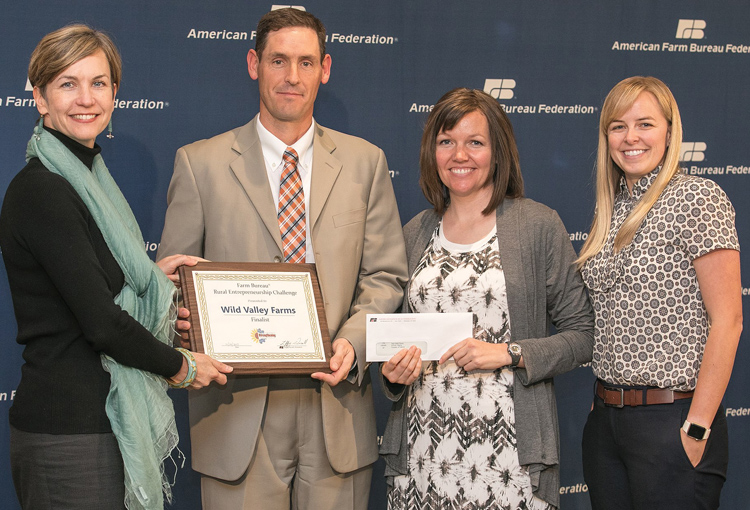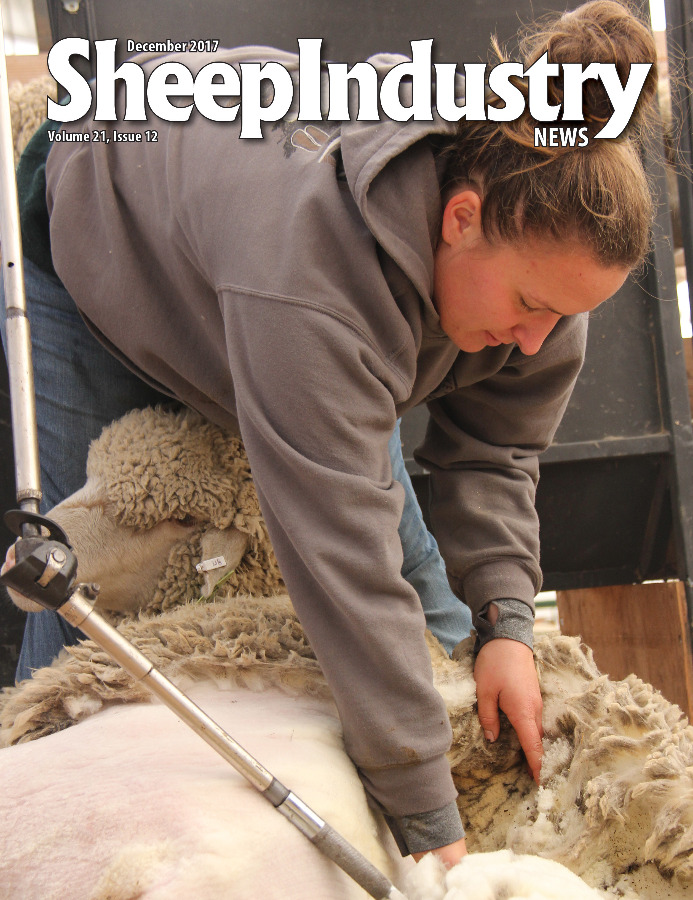Wool Pellets Among Top 4 in Farm Bureau Challenge
JENNIFER VESPER
Morgan County News
The Farm Bureau Rural Entrepreneurship Challenge is the first national business competition focused exclusively on rural entrepreneurs with food and agriculture businesses. This year – out of 470 applicants from 47 states and Puerto Rico – Wild Valley Farms placed in the top four, bringing home $15,000 in start-up money.
The Croydon, Utah-based company hopes its all-natural plant fertilizer that reduces the need for watering by 25 percent will have what it takes to net even more much needed start-up money.
 The application process is pretty straight forward. Rural entrepreneurs go online and fill out an application which tells Farm Bureau judges about you and your business.
The application process is pretty straight forward. Rural entrepreneurs go online and fill out an application which tells Farm Bureau judges about you and your business.
“The application is basically a business plan,” says founder Albert Wilde. “From there, judges who are professors and investment bankers judge each entry.”
In addition to their accomplishments at the Rural Entrepreneurship Challenge, the top four finishers have the opportunity to travel to Nashville on Jan. 7, 2018, to compete in the AFBF Convention for a chance to win additional start-up funds. The winner of the event earns an additional $15,000 – for a total of $30,000.
Judges look for rural businesses that can have the greatest positive impact in their communities and beyond. They also want to make sure the business has the right team in place to be successful.
Wilde feels confident that his business fits this mold.
“We have a unique product that solved two problems: one, waste wool for farmers; and two, fertilizing and water saving for plant lovers.”
Local families can also get in on the fun and give Wild Valley Farms the opportunity to take home the people’s choice award, which comes with an additional $10,000 prize. Check out StrongRuralAmerica.com for details.
“This has been really fun and exciting just to be chosen as a finalist. We were able to get some one-on-one business development help from business experts and media training while in Washington, D.C., so it’s been very educational, as well,” noted Wilde.
Although most of their time was spent on business affairs, Wilde and his wife did have a little bit of time each day to see the sights. “Most of our time was at night. My wife and I rented bikes and biked around the national mall.”
Getting into the top 10 was no easy task in 2017, as applicants increased from 350 last year to 470 this year.
Anne Hazlett, assistant to the U.S. Department of Agriculture under secretary for rural development, was one of the keynote speakers at the ceremony. She addressed many important factors pertaining to rural America today.
“Conditions in many rural areas are challenging right now. When children grow up, many of them do not find employment opportunities in their hometown. Without advocates and investors, many rural entrepreneurs would have far fewer paths to success,” said Hazlett.
She assured the crowd that the USDA wants to be a part of the efforts to further that support.
“We share your passion; we share your vision; we share your commitment to rural America. We are committed to bringing opportunity and growth to these areas. Our Secretary of Agriculture [Sonny Perdue] works to create an environment in which all Americans can prosper, no matter which zip code they are in.”
Among the four finalists was Hawk Knob from Lewisburg, W.V. Hawk Knob creates hand-crafted cider and mead. SwineTech Inc. from Oskaloosa, Iowa, created a Fitbit for pigs that prevents baby pigs from being crushed by their mothers. GeoAir from Knoxville, Tenn., invented a drone that detects molds from the air in row crops like corn. And Wild Valley Farms rounded out the top four.
The competition was introduced four years ago by the American Farm Bureau Foundation Rural Entrepreneurship Initiative. The foundation helps rural entrepreneurs overcome the hurdles they face. REI aims to provide rural entrepreneurs with world-class business training, networks and resources to help them succeed. More than 1,000 businesses in 37 states have been helped through REI projects.
According to a map on their website, Wild Valley Farms is the first business in Utah to be helped through these projects. Wild Valley Farms was also the only farm in Utah listed as an entrant into this Rural Entrepreneurship Challenge.
Wild Valley Farms introduced its innovative product last year. Each year, thousands of sheep farmers shear their flocks and most of the wool obtained is sold to make clothing. However, the belly wool and wool from around the back end of the sheep, called tags, was mostly considered worthless.
Seeing that waste, the Wildes – Albert, Eric and Logan – began focusing their attention on addressing that issue on their own ranch. Their imaginations turned into the reality of Water Wise Wool Pellets. These pellets are “a brand new way to grow healthy, happy, all natural plants.” They are made from 100 percent American raw wool and provide fertilizer, porosity and water-wise holding ability to plants.
Wool pellets have a fertilizer value of 9-1-2 NPK and contain just the right blend of calcium, magnesium, iron, sulfur and other micronutrients. The pellets reduce the need for fertilizer in general as they are a slow-release product. The slow release helps plants grow all year long without refertilization.
The whole process of pelletizing wool took about a year to develop, after which they had to start testing to understand all the benefits of using wool pellets for growing plants. According to Wilde, it took a lot of providence, friendship and hard work to make this innovative product a reality.
These new wool fertilizer superheroes have the ability to hold 20 times their weight in water. This is a real blessing in times of drought, as it helps to reduce the number of times you need to water your plants. In addition to reducing water usage, the pellets also wick away extra water, protecting plants from over-watering.
Wool pellets expand when added to soil, helping to increase porosity for optimal root growth. This increased porosity reduces the need for artificial additives. Water Wise Wool Pellets pride themselves on being natural, organic, sustainable and renewable – all important qualities in today’s market.
Wilde commented that through this development process, he has learned a lot about plants and what they need to grow.
“I have learned how research is done and how to find the information needed to develop a product,” he said.
Learn more about Water Wise Wool Pellets and other great products online at WildValleyFarms.com.


